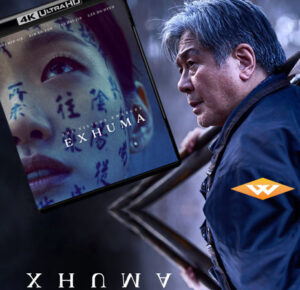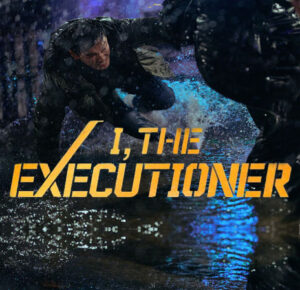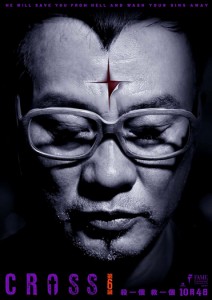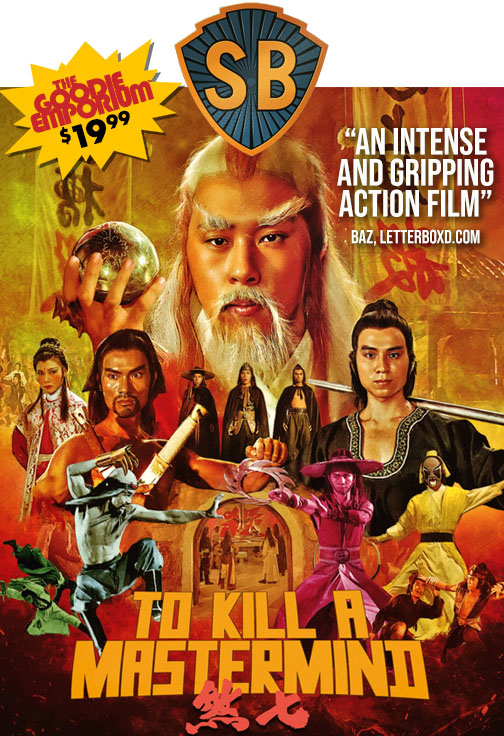
“Master Killers” Theatrical Poster
AKA: The Master Avenger
Director: Wong Hung Cheung
Cast: Casanova Wong, Blacky Ko, Philip Ko Fei, Bolo Yeung, Chiang Kam, Suen Kwok Ming
Running Time: 92 min.
By Paul Bramhall
There’s an old romantic cliché that goes something along the lines of everyone has that someone out there who’s ‘the one’, and what a tragedy it would be if they never realize it. Comparatively, for a kung fu fan like myself, I always thought what an amazing movie it would be if two of my favorite stars of the old-school era, Casanova Wong and Philip Ko Fei, got to face off against each other. For some inexplicable reason, for the longest time I’d thought there was no such movie, until someone guided me towards the direction of a little known title by the name of Master Killers. Like the protagonist of a love story finding ‘the one’ that they never realize existed, for me stumbling across this slice of old school goodness was the kung fu movie fan equivalent.
Not to be confused with Master Killer, the widely popular international title for Lau Kar Leung’s 1978 classic The 36th Chamber of Shaolin, Master Killers is one of the many productions made in the wake of 1978’s Drunken Master. The movie, which put Jackie Chan, Yuen Woo Ping, and their unique blend of kung fu comedy on the map, spawned countless clones which were churned out with an almost reckless abandon in the late 70’s and early 80’s, and there’s no mistaking that Master Killers is one such imitation.
Blackie Ko is on Jackie Chan clone duty as the main character, playing a country bumpkin looking to seek revenge for the death of his father 20 years ago. Ko, who sadly passed away in 2003, is perhaps most well remembered for becoming an action director who specialized in vehicle stunts, as well as directing such Hong Kong movies as Curry and Pepper and Invincible. However before gaining the nickname of the ‘Evel Knievel of Asia’, Ko could bust out the old school shapes choreography with the best of them, and Master Killers is a rare chance to see him in the lead of a kung fu movie.
The plot is as simple as it comes, and is hardly even worth mentioning. But to give it the one line summary – Casanova Wong turns out to be Ko’s long lost brother, and they team up to take down Philip Ko Fei who killed their father 20 years ago. The end. Such finer details like exactly how they became separated, the reasons why Ko Fei killed their father, and an almost endless list of other questions you’ll ask yourself while watching, are never answered. But let’s face it, when you have the talent on board like you do here, even the most jaded old-school movie fan should be willing to overlook the lack of cohesive storytelling.
Master Killers was made in a year that produced a ridiculous amount of top level kung fu movies. Even without looking outside of the cast it’s easy to reel off several – Philip Ko Fei also starred in The Loot, Tiger Over Wall, and Snake Deadly Act. Casanova Wong was in The Master Strikes and Two Toothless Tigers. And everyone’s favorite lump of muscle, Bolo, was in Challenge of the Tiger. When you then consider that people like Jackie Chan were making The Young Master, and Sammo Hung was directing classics like The Victim and Encounters of the Spooky Kind, it’s easy to see why 1980 is viewed as one of the best years for the old-school kung fu movie genre.
So the question is, does Master Killers stand up alongside those other classics that were made in the same year? Perhaps the movie most comparable to Master Killers is one that Casanova Wong starred in during the same year, The Master Strikes. Apart from sharing a similar title (really, how many kung fu movie are there that have the word ‘master’ in the title!?), they both share the element of being comedy heavy for the bulk of their run times, and it’s not a good heavy. It’s the type of heavy which puts you at risk of a heart attack and comes with a severe health warning.
After a fantastic red backdrop opening, a staple of many kung fu movies of the era, which has Blackie Ko strutting his stuff in an amazing display of shapes and acrobatics, things quickly devolve into what amounts to 40 minutes of gurning, pratfalls, and high pitched cockney whining. My personal pet hate even makes an appearance – the child urination joke. Nothing seems to say kung fu cheapie like the arrival of a scene when a child urinates over someone! People getting hit so hard that it causes them to turn around and slowly walk into a tree also seems to qualify as comedy gold here, so it perhaps goes without saying that a certain level of patience and hope is required to get through these scenes.
Even with the arrival of Casanova Wong, and some unintentionally humorous nonsense about the ‘6.5 method pole fighting’ technique, things don’t really look any brighter. An initial misunderstanding which results in a fight between Wong and Ko is uninspired and almost sloppy, with several of the hits clearly not making any contact. However at the 40 minute mark, a strange thing happens. Wong finds himself in a situation which results in him facing off first against Bolo, and then – the moment I was waiting for – against Ko Fei, and suddenly you’ll find yourself sitting bolt upright to pay attention. Ko Fei is also the fight choreographer, and it’s almost as if he spent the first few days of the shoot asleep, having needed his own lengthy fight scene to wake him up. Either that, or it was one of Wong’s kicks.
Wong is convincingly laid waste to by Ko, and left for dead, which sees him disappear from the movie until the finale. However this isn’t such a bad thing. After watching the triple threat of Bolo, Wong, and Ko in action, all of which is fast and fluid, Master Killers builds up sufficient momentum to ensure your attention is maintained. Soon Ko is being trained by Sam Seed (another shameless nod to Drunken Master) in what is, to be fair, an imaginatively put together training sequence that has Ko suspended in the air by a series of rope pulleys, which he has to use to perform pushups. Most importantly, he’s taught the secrets of Empress Kung Fu, which is basically a rip-off of the feminine drunken boxing that Jackie Chan utilizes to defeat Hwang Jang Lee in the finale of Drunken Master.
Master Killers really comes into its own though in its final reel, as from the 1:10 mark it becomes a non-stop fight fest, and every one of them is certified excellence. Starting with Blackie Ko vs. Bolo and his henchman, this fight is fun to watch just to see Bolo’s unique fighting style. While Bolo’s ability to perform choreography doesn’t always get to shine in many of the movies he’s in, that’s not the case here, even throwing in some impressive kicks. What’s so unique about him though is that he doesn’t look at his opponent during the fight, almost like he’s memorized the choreography to the point that he simply focuses on performing it, and trusts the other person to do what they’re supposed to do. It makes for entertaining viewing.
However the real reason to watch Master Killers is the epic 12-minute final fight which pits Ko and Wong against Ko Fei. The fight is almost like a mini-movie in itself, as over the course of the 12 minutes it builds up in both complexity and intensity. Ko Fei is absolutely on fire, and makes it look perfectly believable that he’s capable of taking out both Wong and Ko. At the same time, you kind of feel sorry for him, while Wong opts to go shirtless, and Ko adorned in a thin white t-shirt, Ko Fei performs the whole fight in a traditional long sleeved Chinese shirt and pants. Within the first minute his back and armpits are completely saturated with sweat, redefining what our perceptions of a sweat patch should look like, but he still looks nothing less than a boss.
All three performers get their time to shine during the fight, with the battle constantly segueing from two-on-one attacks to one-on-one beat downs. Ko Fei proves as always why he’s considered to be the king of shaped based choreography, with his fast and powerful movements looking all but unstoppable. Ko proves to be up to the task of matching his choreography, performing some intricate exchanges which take place over satisfyingly long takes. Thankfully Wong lives up to his name of being the Human Tornado, with at least a couple of his kicks being pulled so fast that if Ko Fei had got his timing even a split second off, he probably wouldn’t have a head on his shoulders. Slow motion is also used sparingly throughout the fight to great effect, particularly to highlight Wong when he starts going airborne with his kicks.
In a world where fights like the finale of Master Killers have become as extinct as the dinosaurs, on reflection, sitting through the painful first half of comedic tomfoolery is a small price to pay to witness some jaw dropping displays of kung fu excellence. Just remember to check your armpits for sweat patches once it’s finished.
Paul Bramhall’s Rating: 7.5/10
























Be the 1st to Comment